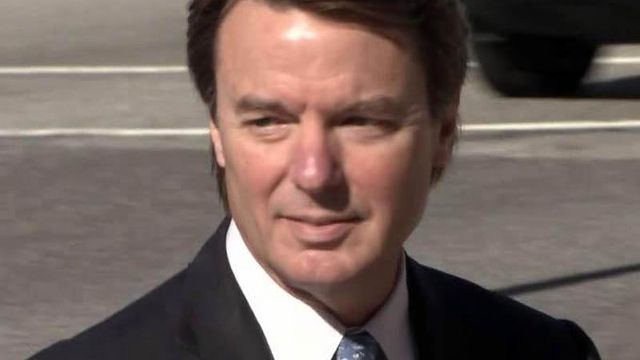Defense rests without hearing from Edwards
John Edwards' lawyers rested their case Wednesday without calling the two-time presidential candidate as a witness to explain whether money from two wealthy political donors was used to keep his mistress away from the media during the 2008 campaign.
Posted — UpdatedClosing arguments in the case are expected to begin Thursday morning, and jurors could begin deliberating Edwards' fate by Friday.
Edwards is charged with masterminding a plan to use about $1 million from Virginia heiress Rachel "Bunny" Mellon and Texas trial lawyer Fred Baron to hide his pregnant mistress, Rielle Hunter, as he ran for the White House. He faces up to 30 years in prison if convicted on all six charges.
Reporters lined up for hours outside the federal courthouse in Greensboro Wednesday morning in anticipation that Edwards, his elder daughter, Cate, and possibly Hunter would testify. But defense attorney Abbe Lowell quickly ended such speculation when he told U.S. District Judge Catherine Eagles that testimony in the case would be finished by the end of the day.
Instead of a headline-grabbing witness, the defense ended with Jim Walsh, a former FBI white-collar crime investigator whom they hired to review the financial and phone records of Hunter and Andrew Young, a former Edwards aide who was the government's star witness in the case.
Walsh testified Monday that he found discrepancies between what Young claimed to have spent on Hunter and what he and his wife actually spent for her personal expenses and medical care. He also said that the Youngs routinely spent more than they earned in 2006-08.
The defense has argued that Young milked Mellon for money without Edwards' knowledge in order to finance a lavish lifestyle.
On cross-examination Tuesday, Walsh said that the Youngs could have spent money on Hunter that wasn't reflected in his breakdowns of their finances. He also said that the couple didn't overdraw their bank accounts.
Lowell also read into evidence points that both prosecutors and defense agreed on, such as that Young and his wife considered selling a "private video of John Edwards and Rielle Hunter" but didn't.
The purported sex tape was the subject of a civil suit between Hunter and the Youngs that was settled a few months ago. As part of the settlement, all copies of the tape were supposed to be destroyed.
Other points that both sides agreed on included that Hunter couldn't have become pregnant until late May 2007 – that calls into question Young's timeline of events – and that Young told federal investigators that he had spoken with Baron, Baron's wife and David Kirby, Edwards' former law partner, who all reassured him that secret payments from Mellon weren't campaign contributions.
While prosecutors spent three weeks laying out a sordid tale of sex, money and lies, Edwards' defense called seven witnesses in slightly more than two days and focused on campaign finance law. They argued that money paid by third parties to support a candidate's mistress and her child isn't a campaign contribution.
Lowell asked Wednesday morning that a transcript of a Federal Elections Commission meeting from last July should be entered into evidence. During the meeting, commissioners approved an audit of Edwards' 2008 campaign finance reports and said that they didn't consider the Mellon and Baron payments to be campaign contributions.
David Harbach, a U.S. Department of Justice lawyer prosecuting the case, said "the musings of an FEC commissioner" shouldn't be considered, noting that the agency didn't have all of the evidence in the case at the time.
Eagles, who previously prevented a former FEC chairman from telling jurors that he thought the payments weren't campaign contributions, ruled that the transcript wouldn't be allowed as evidence.
"I don't think the opinions of others, whether they are FEC commissioners or not, is particularly helpful for this jury," she said.
Still, Eagles was prepared to allow the defense to introduce the testimony if the government called an FEC attorney to the stand as a rebuttal witness.
Harbach said the attorney could counteract testimony of Lora Haggard, the chief financial officer of Edwards' 2008 campaign. She testified Monday that FEC auditors never asked her to amend campaign finance reports to include the Mellon and Baron money, even after Edwards was indicted last summer.
After Eagles' ruling, prosecutors decided against calling the FEC attorney as a witness.
Eagles and attorneys for both sides spent Wednesday afternoon haggling over words and phrases like "tangential" and "real purpose" as they tried to compromise on what instructions the judge would give to jurors on campaign finance laws and what is considered a political contribution. Legal observers say what she tells the jury Thursday before they begin deliberating could be key to deciding whether Edwards is convicted or acquitted.
Although Eagles said she tried to balance the wishes of prosecutors and the defense in drafting her instructions, she delivered a clear victory for the government by saying she would tell the jury that money doesn't have to be for "the sole purpose" of influencing an election to be considered a campaign contribution.
Lowell unsuccessfully urged Eagles to provide more instruction that Edwards had a "good faith" belief that the money from Mellon and Baron were legal gifts and not excessive campaign donations. Citing Young's testimony that Edwards had consulted campaign finance experts who assured him the payments weren't illegal, Lowell said that amounted to testimony from Edwards.
"(Those were) Mr. Edwards' words on his belief of legality," Lowell said. "That's why he didn't need to testify, because this was spoken by him."
• Credits
Copyright 2024 by Capitol Broadcasting Company. All rights reserved. This material may not be published, broadcast, rewritten or redistributed.






